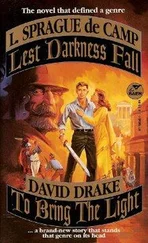How well I remember, as a small boy in the 1920s and '30s, my mother and father talking bitterly of how the war had ruined everything. They were not speaking of the then fairly recent Emperors' War of 1914—16, but of the War of Southron Independence which still, nearly seventy years later, blighted what was left of the United States.
Nor were they unique or peculiar in this. Men who slouched in the smithy while Father shod their horses, or gathered every month around the post office waiting for the notice of the winning lottery numbers to be put up, as often cursed the Confederates or discussed what might have been if Meade had been a better general or Lee a worse one, as they did the new-type bicycles with clockwork auxiliaries to make pedaling uphill easier, or the latest scandal about the French emperor Napoleon VI.
I tried to imagine what it must have been like in Granpa Hodgins's day, to visualize the lost past—that strange bright era when, if it could be believed, folk like ourselves and our neighbors had owned their farms outright and didn't pay rent to the bank or give half the crop to a landlord. I searched the wiggling crayon lines that composed Granpa Hodgins's face for some sign that set him apart from his descendants.
“But what did he do to lose the farm?” I used to ask my mother.
“Do? Didn't do anything. Couldn't help himself. Go along now and do your chores; I've a terrible batch of work to get out.”
How could Granpa's not doing anything result so disastrously? I could not understand this any more than I could the bygone time when a man could nearly always get a job for wages which would support himself and a family, before the system of indenture became so common that practically the only alternative to pauperism was to sell oneself to a company.
Indenting I understood all right, for there was a mill in Wappinger Falls which wove a shoddy cloth very different from the goods my mother produced on her hand loom. Mother, even in her late forties, could have indented there for a good price, and she admitted that the work would be easier than weaving homespun to compete with their product. But, as she used to say with an obstinate shake of her head, “Free I was born and free I'll die.”
In Granpa Hodgins's day, if one could believe the folktales or family legends, men and women married young and had large families; there might have been five generations between him and me instead of two. And many uncles, aunts, cousins, brothers, and sisters. Now late marriages and only children were the rule.
If it hadn't been for the war… This was the basic theme stated with variations suited to the particular circumstance. If it hadn't been for the war the most energetic young men and women would not turn to emigration; visiting foreigners would not come as to a slum; and the great powers would think twice before sending troops to restore order every time one of their citizens was molested. If it hadn't been for the war the detestable buyer from Boston— detestable to my mother, but rather fascinating to me with his brightly colored vest and smell of soap and hair tonic— would not have come regularly to offer her a miserable price for her weaving.
“Foreigner!” she would always exclaim after he left; “Sending good cloth out of the country.”
Once my father ventured, “He's only doing what he's paid for.”
“Trust a Backmaker to stand up for foreigners. Like father, like son; suppose you'd let the whole thieving crew in if you had your way.”
So was first hinted the scandal of Grandfather Backmaker. No enlarged portrait of him hung anywhere, much less over the mantel. I got the impression my father's father had been not only a foreigner by birth, but a shady character in his own right, a man who kept on believing in the things for which Granpa Hodgins fought after they were proved wrong. I don't know how I learned that Grandfather Backmaker had made speeches advocating equal rights for Negroes or protesting the mass lynchings so popular in the North, in contrast to the humane treatment accorded these noncitizens in the Confederacy. Nor do I remember where I heard he had been run out of several places before finally settling in Wappinger Falls or that all his life people had muttered darkly at his back, “Dirty Abolitionist! “—a very deep imprecation indeed. I only know that as a consequence of this taint my father, a meek, hardworking, worried little man, was completely dominated by my mother who never let him forget that a Hodgins or a McCormick was worth dozens of Backmakers.
I must have been a sore trial to her for I showed no sign of proper Hodgins gumption, such as she displayed herself and which surely kept us all—though precariously—free. For one thing I was remarkably unhandy and awkward, of little use in the hundred necessary chores around our dilapidated house. I could not pick up a hammer at her command to do something about fixing the loose weatherboards on the east side without mashing my thumb or splitting the aged, unpainted wood. I could not hoe the kitchen garden without damaging precious vegetables and leaving weeds intact. I could shovel snow in the winter at a tremendous rate for I was strong and had endurance, but work requiring manual dexterity baffled me. I fumbled in harnessing Bessie, our mare, or hitching her to the cart for my father's trips to Poughkeepsie, and as for helping him on the farm or in his smithy, I'm afjaid my efforts drove that mild man nearest to a temper he ever came. He would lay the reins on the plowhorse's back or his hammer down on the anvil and say mournfully:
“Better see if you can help your mother, Hodge. You're only in my way here.”
On only one score did I come near pleasing Mother: I learned to read and write early, and exhibited some proficiency. But even here there was a flaw; she looked upon literacy as something which distinguished Hodginses and McCormicks from the ruck who had to make their mark, as an accomplishment which might somehow and unspecifically lead away from poverty. I found reading an end in itself, which probably reminded her of my father's laxity or Grandfather Backmaker's subversion.
“Make something of yourself, Hodge,” she admonished me often. “You can't change the world"—an obvious allusion to Grandfather Backmaker—"but you can do something with it as it is if you try hard enough. There's always some way out.”
Yet she did not approve of the post-office lottery, on which so many pinned their hopes of escape from poverty or indenture. In this she and my father were agreed; both believed in hard work rather than chance.
Still, chance could help even the steadiest toiler. I remember the time a minibile—one of the small, trackless locomotives—broke down not a quarter of a mile from Father's smithy. This was a golden, unparalleled, unbelievable opportunity. Minibiles, like any other luxury, were rare in the United States, though they were common enough in prosperous countries such as the German Union or the Confederacy. We had to rely for our transportation on the never-failing horse or on the railroads, worn out and broken down as they were. For decades the great issue in Congress was the never-completed Pacific transcontinental line, though British America had one and the Confederate States seven. (Sailing balloons, economical and fairly common, were still looked upon with some suspicion.) Only a rare millionaire, with connections in Frankfurt, Washington-Baltimore, or Leesburg, could afford to indulge in a costly and complicated minibile requiring a trained driver to bounce it over the rutted and chuckholed roads. Only an extraordinarily adventurous spirit would leave the tar-surfaced streets of New York or its sister city of Brooklyn, where the minibiles' solid rubber tires could at worst find traction on the horse or cablecar rails, for the morasses or washboard roads which were the only highways north of the Harlem River.
Читать дальше












